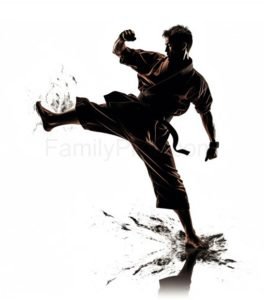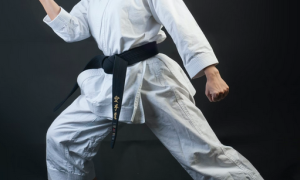Karate is a traditional Japanese martial art that has become immensely popular worldwide. The benefits of karate for kids are extensive, making it an excellent activity for children’s physical, mental, and social development. This comprehensive guide will explore the world of karate for kids and the many advantages it offers.
With proper instruction and regular practice, karate can positively shape a child’s mind and body. It emphasizes core values like perseverance, patience, and setting goals. Karate is an engaging way for kids to learn self-control and life skills that will aid their growth into adulthood.
This guide aims to help parents understand karate and make an informed decision about enrolling their child. It provides an in-depth look at what makes karate an excellent choice for kids of all ages.
In short, Is Karate Good for Kids?
Certainly! Karate is highly beneficial for kids as it offers a holistic approach to their development. Through karate, children improve their physical fitness, coordination, and self-confidence while learning valuable character traits such as discipline and respect. Additionally, karate fosters important life skills like teamwork and effective communication, setting children up for success in various aspects of their lives.
Table of Contents
Toggle
Table of Contents
Toggle![]()
Benefits of Karate for Kids
Karate provides immense benefits for children, from physical fitness to life lessons. Here is an in-depth look at the advantages karate offers kids:
Physical Benefits
- Improves overall fitness and strength. Karate works the whole body through techniques like punches, kicks, and blocks. It builds core strength and muscle endurance.
- Enhances coordination and agility. The intricate moves of karate forms and sparring improve balance, body control, and reflexes.
- Increases flexibility. The dynamic stretching and range of motion in karate boosts flexibility.
- Develops strong cardiovascular health. Training improves stamina, endurance, and breathing.
- Helps maintain a healthy weight. The aerobic workout burns calories and fat.
Mental Benefits
- Teaches focus and discipline. Following instructions, completing drills, and perfecting moves requires great focus.
- Builds confidence. As skills improve, children gain assurance and belief in themselves.
- Promotes a growth mindset. Karate encourages perseverance through challenges and learning from mistakes.
- Fosters humility and respect. Etiquette, bowing, and working with others instills respect.
- Provides stress relief. The physical exertion can help manage anxiety, frustration, and tension.
Social Benefits
- Develops social skills. Karate teaches valuable skills like cooperation, patience, and good sportsmanship.
- Encourages camaraderie. Sparring partners and groups foster friendships and camaraderie.
- Teaches self-defense. Kids learn controlled responses to handle confrontation.
- Reinforces discipline. Respect for the sensei and rules of the dojo teaches discipline.
With its multifaceted benefits, karate is an invaluable experience for children that will aid their development in body, mind and spirit. For parents considering martial arts, karate is often one of the top recommendations along with other arts like taekwondo, jiu-jitsu, and judo. Karate offers a well-rounded approach that encompasses physical activity, mental focus, and character growth. If you’re exploring the best martial arts for your kids, be sure to check out our guide on the Top 6 Best Martial Arts for Kids based on key factors like benefits, accessibility, and fitness. Karate remains a premier choice to engage kids in an enriching activity that teaches lessons to last a lifetime.
![]()
Why do parents put their kids in karate?

Parents have various reasons for enrolling their children in karate classes. The decision to introduce children to martial arts such as karate is often driven by a combination of physical, mental, and personal development considerations.
- Cultivating Stronger Perseverance – Parents find karate helps children develop greater perseverance and determination. Mastering new skills and advancing in rank requires overcoming difficulties without giving up. This mindset transfers to school and other challenges.
- Teaching Mindfulness and Calmness – The breathing techniques, mental focus, and self-control learned in karate impart valuable mindfulness and calmness. Parents see children applying this to remain poised rather than impulsive.
- Sharpening Listening and Focus – The discipline of intently listening to instructions from the sensei enhances children’s focus and listening abilities. Parents notice improved concentration at home and school.
- Promoting Conflict Resolution Skills – Karate boosts confidence while emphasizing avoiding unnecessary fights. Parents observe their kids seeking win-win solutions when disagreements arise and standing up to peer pressure.
- Building Greater Independence and Responsibility – As karate teaches discipline and self-reliance, parents often see their children becoming more responsible and independent with schoolwork, chores, and decisions.
- Supporting Overall Mental Health – Many parents find karate helps children struggling with conditions like ADD/ADHD, anxiety, or depression through its structured physical and mental training.
- Improving Social Skills and Cooperation – Karate develops social skills like cooperation, good sportsmanship and camaraderie. Parents see kids translating this to build stronger friendships and communicate better.
- Instilling a Sense of Accomplishment – Achieving each colored belt rank provides an immense sense of achievement. Parents see this boosting their children’s confidence and motivation to strive for goals.
The anecdotes and insights from parents reveal the transformative impact karate can have on developing essential life skills and values in children.
![]()
What does a Karate for Kids class look like?
A karate class for beginner kids generally follows a structured format to develop skills progressively while keeping students engaged. While specific activities may vary, here are some common elements to expect in a children’s karate session:
| Phase | Activities |
|---|---|
| Warm-Up | – Light aerobic activity (jogging, jumping jacks) – Stretching and flexibility exercises – Coordination drills (skipping, hopping, balancing) |
| Technical Skills | – Stances (horse stance, front stance, fighting stance) – Strikes (punches, palm strikes, elbow strikes) – Kicks (front kick, side kick, roundhouse kick) – Blocks (low block, rising block, knife hand block) |
| Kata Practice | – Step-by-step practicing of set movement patterns – Memorization and repetition to perfect form |
| Sparring | – Partners practice controlled sparring – Taking turns defending against strikes/kicks – Focus on form and technique |
| Games | – Karate versions of tag or other games |
| Cool-Down | – Stretching and light aerobic activity – Reflections and closing remarks |
![]()
What age should a kid start karate?
Determining the optimal age for a child to begin their karate journey is a common concern for parents. While there is no one-size-fits-all answer, there are general guidelines to consider. Most reputable karate dojos welcome children as young as four or five years old. At this age, children typically have the necessary attention span, coordination, and ability to follow instructions required for introductory karate classes.
Is my kid ready to start karate?
Apart from age, several readiness factors contribute to a child’s readiness for karate training. Physical development, emotional maturity, and interest in martial arts are the main variables to consider. Children who demonstrate basic motor skills, mainly balance and coordination, are often well-prepared for the physical demands of karate. Additionally, emotional maturity, including the ability to follow directions, respect authority, and interact positively with peers, plays a vital role in their readiness for karate classes.
Is my kid too old to start karate?
Absolutely not! any age is great to begin karate for kids. While it’s true that some children may have started at an earlier age, there are numerous examples of individuals who began their martial arts journey during their late teens or even older and achieved great success. Early, exposure to karate offers several advantages for children. Firstly, it fosters discipline and routine, helping them develop essential life skills. Through regular attendance and adherence to dojo rules, children learn the importance of punctuality, focus, and commitment—a solid foundation for success in various areas of life.
Is Karate Safe for your child?
Karate is very safe for children when practiced under qualified instructors, in age-appropriate classes, and with a focus on safety precautions such as warm-ups, proper techniques, and supervised training. Choosing a reputable martial arts school and maintaining open communication with instructors are key for ensuring a safe karate experience for kids.
![]()
How Many Years Does it take to Learn Karate?

The duration it takes to learn karate for kids can vary significantly and depends on several factors. These factors include the frequency and consistency of training, the individual’s natural ability and physical aptitude, their persistence through difficult challenges, and the goals and aspirations of the practitioner.
Regular and consistent training is crucial for skill development and progress in karate. Those who attend classes multiple times per week and engage in consistent practice outside of class progress at a faster pace compared to those who train less frequently. Dedication and commitment to training are key factors in accelerating the learning process.
Individual attributes, such as natural athleticism, coordination, and body awareness, can also influence the learning timeline. Some individuals may grasp techniques more quickly and progress faster due to their inherent physical abilities. However, it’s important to note that with consistent effort and practice, anyone can make significant progress in karate regardless of their starting point.
The complexity and depth of the chosen karate style can also impact the learning timeline. Certain styles may have more intricate techniques, katas (forms), and philosophies, requiring additional time to master. It’s essential to approach karate as a lifelong journey, understanding that continuous learning and improvement are part of the process.
Progression through belt ranks and skill development
In karate, progression is often marked by the attainment of different belt ranks. As students demonstrate their proficiency and understanding of the techniques, katas, and principles of karate, they advance to higher belt ranks. The specific belt system may vary depending on the karate style or organization.
The time it takes to progress through belt ranks varies depending on the individual and the requirements set by the dojo or organization. Typically, the early belt ranks are achieved relatively quickly, providing a foundation of basic techniques and fundamental principles. As practitioners advance to higher ranks, the complexity of the techniques and the level of proficiency required increases, necessitating more time and practice to progress.
In conclusion, the time it takes to learn karate varies depending on several factors, including training frequency, individual attributes, the complexity of the karate style, and personal goals. Regular and consistent training, along with dedication and a growth mindset, are key to making progress in karate. The belt rank system provides a framework for progression, but the journey should be viewed as a lifelong pursuit of skill development and personal growth.
![]()
Is karate good for ADHD?
Karate for kids has shown to have several positive effects on children with Attention Deficit Hyperactivity Disorder (ADHD). While karate alone may not be a cure for ADHD, it can provide valuable benefits that complement other treatments and interventions.
One significant advantage of karate for children with ADHD is the structured and disciplined environment it offers. Karate classes follow a set routine, with clear rules and expectations. This structured setting helps children with ADHD develop a sense of predictability and stability, which can aid in improving their focus and attention. This effect is similar across most martial arts like Taekwondo
Focus, discipline, and self-regulation benefits
Karate training requires concentration, focus, and self-discipline. These aspects can be particularly beneficial for children with ADHD, as they provide opportunities to practice and enhance their attention skills. Through repetitive movements, katas (forms), and partner drills, children with ADHD learn to direct their attention to the present moment and concentrate on the task at hand.
Furthermore, karate teaches self-regulation skills. Practitioners are encouraged to control their impulses, manage their energy, and exhibit self-control during training. Learning to follow instructions, respect boundaries, and regulate their behaviour in the dojo can transfer to improved self-regulation skills in other areas of life for children with ADHD.
Additionally, karate provides opportunities for goal setting and achievement. As children progress through belt ranks and learn new techniques, they experience a sense of accomplishment and build self-confidence. This sense of achievement can be particularly important for children with ADHD, who may face challenges related to frustration due to their condition.
![]()


